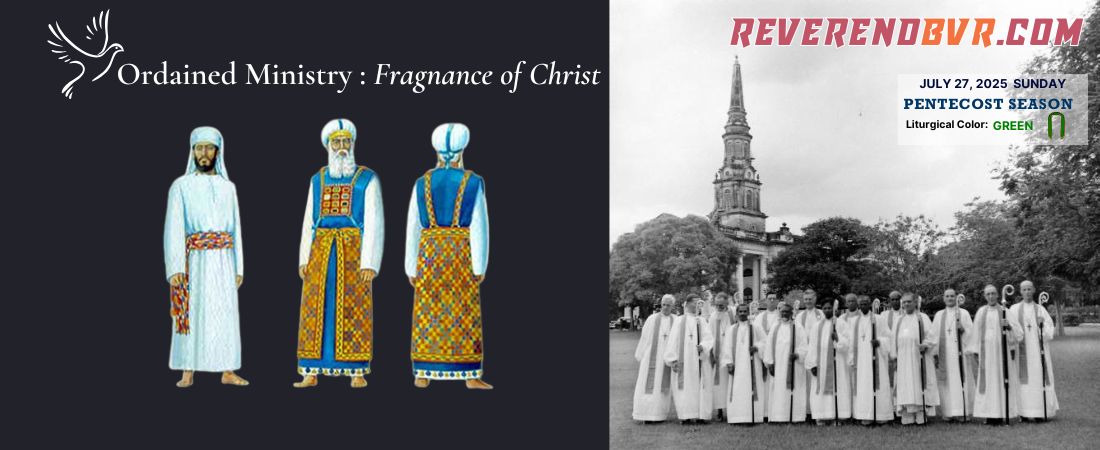To be ordained is to be consecrated and sent as a fragrant offering of Christ’s love and holiness. This ministry calls us to reflect the light and sacrifice of Jesus, living not only as servants but as the very aroma of God’s redemptive work in the world.
Sermon Title: Ordained Ministry: Fragrance of Christ
Date: Sunday, July 27, 2025.
Readings: Exodus 29:1-9 | Psalm 99 | Ephesians 5:1-14 | Luke 10:1-11
Website: www.reverendbvr.com
Introduction:
The concept of ordained ministry is deeply rooted in the Christian tradition, where individuals are called to represent Christ, serve the community, and share in His ministry. The Bible describes this sacred responsibility through powerful metaphors and acts of consecration. One of the most profound images of ordained ministry is found in the metaphor of the “fragrance of Christ.” This term encapsulates the calling and responsibility of those who are ordained to be emissaries of God’s love, justice, and holiness in the world. We will explore this theme through key biblical texts, particularly Exodus 29:1-9, Psalm 99, Ephesians 5:1-14, and Luke 10:1-11, along with a theological and linguistic analysis of their original meanings.
1. Consecration of the Priests (Exodus 29:1-9)
The process of ordination begins with consecration, which is highlighted in Exodus 29. This passage describes the ritual of consecrating Aaron and his sons as priests to serve before God. The key elements of this ritual serve as a foundation for understanding the holy calling of ordained ministers:
- The Offering (Exod. 29:1-3): A bull and two rams are sacrificed along with specific loaves of bread made from the finest wheat flour, symbolizing the completeness and purity required for those called into service.
- The Garments (Exod. 29:5-9): Aaron is clothed in sacred garments, including a tunic, an ephod, and a turban. The priest’s attire is not merely for physical protection; it signifies the honor and sanctity of their calling, showing that ordained ministers are to bear the visible marks of holiness and set apartness.
- The Anointing (Exod. 29:7): The anointing oil poured on Aaron’s head represents the Spirit’s sanctifying power. This is not just a symbolic gesture but a real impartation of divine authority and grace. The anointing sets the individual apart for a higher purpose: service to God and His people.
The anointing is of particular significance because it links ordination to the empowerment of the Holy Spirit. In the Hebrew, the term for anointing (מָשַׁח, mashach) is deeply tied to the idea of “setting apart” for a divine task. The priesthood is not a mere human office; it is a divine vocation established for the glory of God. This sets the stage for understanding ordained ministry as an ongoing offering and service.
2. The Holiness of God and His Ministers (Psalm 99)
Psalm 99 serves as a powerful hymn of praise that magnifies the holiness of God. It reminds us that those who are called into ministry must reflect the holiness of God, serving as instruments of His justice and mercy. In verses 6-9, the psalmist recalls Moses, Aaron, and Samuel as representatives of God’s holiness and His justice:
- “Moses and Aaron were among his priests; Samuel was among those who called on his name; they called on the Lord and he answered them.” (Psalm 99:6)
- “Exalt the Lord our God and worship at his holy mountain, for the Lord our God is holy.” (Psalm 99:9)
These verses emphasize that the role of ordained ministers is to uphold the sanctity of God’s name and to intercede on behalf of the people. The holiness of the priest is directly connected to the holiness of God Himself. The term “priests” in this context (כּהֵן, kohen) is associated with both a sacrificial role and one of intercessory prayer. Ordained ministers are called to live out this dual function: offering prayers and sacrifices that reflect God’s holiness and calling the people to worship.
3. Walking in Love and Light (Ephesians 5:1-14)
In the New Testament, the calling to ordained ministry is exemplified in the life of Christ, who “gave himself up for us as a fragrant offering and sacrifice to God” (Ephesians 5:2). This powerful image highlights two key aspects of ordained ministry:
- The Fragrance of Christ (Eph. 5:2): The apostle Paul likens Christ’s sacrificial love to a sweet fragrance, which is both pleasing and sacrificial. The term fragrant offering (εὐωδία, euodia) comes from the Greek word for “fragrance,” which in this context symbolizes the pleasing aroma of sacrificial love. Ordained ministers, in following Christ, are called to reflect this same fragrant offering in their ministry. Their actions, words, and sacrifices should be a pleasing aroma to God.
- Living as Children of Light (Eph. 5:8-9): Paul exhorts believers to “live as children of light,” with the fruits of goodness, righteousness, and truth. This calls for a life marked by moral integrity and alignment with God’s holiness. For ordained ministers, this means embodying the light of Christ in all aspects of life and ministry, shining in a world that is often shrouded in darkness.
The ordination process is, therefore, a calling to embody Christ’s love and sacrifice in every part of one’s life. The term sacrifice (θυσία, thysia) used in the New Testament also links back to the priestly work of offering, where the priest’s life becomes an offering to God on behalf of others.
4. The Commissioning of the Seventy-Two (Luke 10:1-11)
In Luke 10:1-11, Jesus sends out seventy-two disciples, commissioning them for ministry. This passage highlights the nature of the ordained ministry in the context of the early Church:
- The Urgency of the Harvest (Luke 10:2): Jesus states, “The harvest is plentiful, but the workers are few.” This underscores the urgency of the work and the need for ordained ministers to be dedicated to their calling. Ordination is not merely a title or role but an urgent mission to gather God’s people.
- The Vulnerability of the Worker (Luke 10:3): Jesus sends the disciples “like lambs among wolves,” emphasizing the vulnerability and sacrifice involved in ministry. Ordained ministers are called to face opposition, difficulties, and even rejection in their service to Christ.
The word sent (ἀποστέλλω, apostello) used here is the root of the term apostle and conveys the idea of being commissioned with divine authority and purpose. The ordained minister, like the seventy-two, is sent to proclaim the Kingdom of God, heal the sick, and spread peace. The act of wiping the dust off their feet (Luke 10:11) symbolizes the endurance required in the face of rejection and difficulty.
Theological Implications and Practical Applications
The ordained ministry is a sacred calling that involves both personal transformation and communal service. The minister, anointed by God, is called to live a life of holiness, embodying the “fragrance of Christ” in both word and deed. This requires a life marked by humility, sacrifice, and love. Theological reflection on the consecration of priests in the Old Testament, the sacrificial offering of Christ in the New Testament, and the mission of the Church in the world reveals a high and noble calling.
| Key Themes | Old Testament (Exodus 29) | New Testament (Ephesians 5, Luke 10) |
| Consecration | Rituals of holiness and anointing for service to God | Christ’s sacrifice as the ultimate fragrant offering |
| Holiness | Priestly garments symbolize holiness | Ministers must reflect Christ’s holiness and light |
| Sacrifice | Offerings for atonement and consecration | Living as a fragrant sacrifice to God |
| Mission | Priestly role of intercession | Commissioning to proclaim the Kingdom of God |
Conclusion
In closing, we reflect on the sacred calling of those who are ordained to ministry. Their lives are meant to reflect the holiness, sacrifice, and love of Christ in a world that desperately needs the fragrance of the Gospel. May we all, whether in ordained ministry or not, live lives that reflect this fragrant offering to God.
Prayer:
Gracious God, we thank You for the calling You have placed on our lives, especially those whom You have set apart for ordained ministry. May their lives be filled with the fragrance of Christ, and may their service be a reflection of Your holiness, love, and sacrifice. Empower them to walk in Your light, exposing the deeds of darkness and bringing the light of the Gospel to all they encounter. We pray for the strength to live as true ministers of Your love and justice, offering our lives as living sacrifices. In Jesus’ name, we pray. Amen.
Bibliography:
- Bible translations: New International Version (NIV), New Revised Standard Version (NRSV)
- Theological Dictionary of the New Testament, ed. Gerhard Kittel
- The Oxford Companion to the Bible, ed. Bruce M. Metzger and Michael D. Coogan
- Exodus: A Theological Commentary, by John I. Durham
© 2025 ReverendBVR.com | High-Academic Sermon Series, 2025.
Content licensed under Creative Commons Attribution-NonCommercial-NoDerivatives 4.0 International (CC BY-NC-ND 4.0). You are free to share — copy and redistribute the material in any medium or format with proper attribution. No commercial use or modifications allowed without explicit permission.
For further sermons and biblical reflections, please visit 🌐 www.reverendbvr.com/sermons

